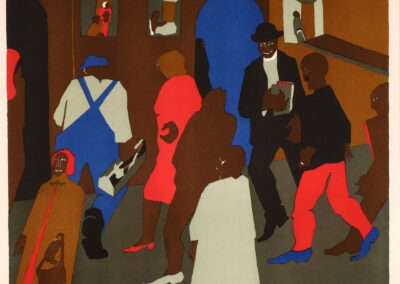
Helen M. Post (b. 1907 Bloomfiend, NJ; d. 1978), Xanti Schawinsky’s Spectodrama (digital print). Western Regional Archives, State Archives of NC.
Figurative Abstraction: Constructing Identity
The language of abstraction expanded throughout the 20th century as artists sought new ways to tell their stories and understand their place in an ever-changing world. The surge of creativity in Europe that followed WWI gave rise to the modernist innovations of the Bauhaus and artistic movements such as Dada and Surrealism. These ideas influenced practices at Black Mountain College, where artists celebrated abstraction across mediums, often incorporating the body or marking its movements. When artists abstract the body, they create visual metaphors that represent their own self image, their place in society, or the perceptions and prejudices of others.
Building a Better Table + You’re Welcome – Southern Equality Studios
We’ve been stolen, beaten, killed, cheated. We built your schools. We built your White House. We built your economy. We built the culture. We built this table. Yet you sit at this table we helped build while staying silent and complicit in your comfort. We’re bringing our seats, pulling up to the table and we cordially invite you to listen and do better and if you can’t do better, we’ll build another table and if you want to sit with us, we cordially invite you to tear down the barriers of the patriarchy and white supremacy:
Give us our reparations.
Ask and respect everyone’s pronouns. Stop saying ma’am and sir to strangers.
Stop appropriating our culture and denying our representation.
Don’t hide behind the bible to justify homophobia and transphobia.
Confront bigotry and speak out against xenophobia.
Stop ignoring us when there are environmental disasters fueled by neglectful racism.
We are not invisible and we are not disposable.
Teach our history!
– Southern Equality Studios
The Campaign for Southern Equality works for the lived and legal equality of LGBTQ Southerners, leveraging a broad array of strategies and tactics – including the power of art. Their program Southern Equality Studios (SES) connects with and supports queer creatives across the South and explores how art is a catalyst and force in achieving social change.
Black Mountain – Onicas Gaddis
I am a citizen of the world…
Being a citizen of the world, I feel like it’s my responsibility to live on this planet in harmony with all things. Recognizing that all humans are citizens of the world is the one thing I think could solve most of our issues with each other.
I’ve been painting for over 20 years and drawing for as long as I can remember. I spent a lot of time alone in the creative process. Making art has allowed me to create my own world, a world that I feel comfortable in.
It wasn’t until Sarah Carlisle Towery told me that I am an artist, that I actually found a purpose in this life. Growing up in the foster care system in Alabama left me with a lot of scars emotionally. Some of those scars I’m still working on at age 46.
I’m thankful to have met ‘Miss Sarah’ and everyone else at the Alabama Art Colony. Meeting this group changed my life’s course or even more so, it put me on the right path
I now have two kids, Royal (16) and Roman (14) who are also citizens of the world. My hope for them is that they will be treated as citizens of the world, and that they will also treat everyone they meet as citizens as well.










